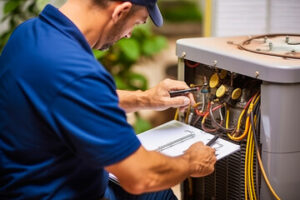Air Conditioning Installation Los Angeles is a complex project that should be left to an experienced professional. It includes replacing breakers in your electrical panel, installing ductwork linking to your existing HVAC system, and removing old equipment.

Before the day of your new AC installation arrives, prepare for the contractors to be there by clearing a path in and around your home. This can include removing tables, toys, rugs, and other items that may get in the way or be damaged by equipment and tools. It’s also a good idea to clear any outdoor space where the air conditioner will be placed, as this is where the team will work to install your system.
The installation process starts with the removal of the old air conditioner. A contractor will drain and disconnect the refrigerant, a process that requires specialized equipment. This is done so that the contractor can verify that your system is not leaking and will not be a source of future problems.
Next, the installation team will clear the area around both the indoor and outdoor units. This will involve removing debris and obstacles, as well as trimming any plants or shrubs that are in the way of the equipment. This helps to minimize the amount of time it takes to finish the job and reduces the chance that any objects are damaged by moving or installing the new equipment.
On the day of the air conditioning installation, you will need to be at home so that the contractors can perform a review of your system. This includes checking the unit to ensure that it matches the one that you ordered. In addition, the contractors will check to make sure that the pad where the new air conditioner will sit is adequate. Many modern AC units are larger and taller than their predecessors, and they often require a pad that is either bigger or leveled in order to accommodate them. The pad should be made of a composite material rather than poured concrete, as it can better absorb vibration and will hold the air conditioner in place.
The team will then set the new air conditioner in its place and connect it to the electrical system. They will then test the air conditioner by blowing cold air through the vents to ensure that it is working properly. This is a vital step in the process, as it allows the contractors to determine if any changes need to be made. It also gives the homeowner the opportunity to ask any questions that they might have about the operation of the new air conditioner.
Installation
When the time comes to replace your existing air conditioning system, you want an HVAC specialist that understands how important this project is. Your new AC should work properly, so you can enjoy energy-efficient comfort all summer long.
A good air conditioner installation process starts with a thorough evaluation of your home’s cooling infrastructure. This includes ductwork, which may need to be repaired or replaced during the installation process. The HVAC professional will also assess your ducts for leaks, which are common and can cause inefficient operation and energy waste. The evaluation also helps determine what size of air conditioning unit will be right for your home.
Before starting the actual installation, your technician will use a recovery machine to remove any refrigerant from your old system. It’s illegal to vent refrigerant into the air, so it must be drained and stored safely. The team will then disconnect electrical wiring from the old system and remove the power conduit, or “whip”, and a service disconnect box (if your old system doesn’t have one).
The area where your new outdoor unit sits will probably need some preparation. The ground may need to be leveled or built up, and a new pad set in place. This pad should be a composite pad that can absorb vibration and will last for the life of your new air conditioner.
After the pad is in place, your air conditioning installation team will uncrate and mount your new air conditioning equipment. They’ll then connect it to the evaporator coil over your furnace and copper refrigerant lines. They’ll then test the unit to ensure that it works properly.
If you’re using a window air conditioning system, your installation team will install a flange to the bottom of the unit so it can be screwed into the top window sash. The flange is designed to prevent the sash from accidentally opening.
Removal
Once the site has been cleared and any floor protection put down, the team will begin by removing the old outdoor unit. This includes replacing the pad that it sits on with a composite one, which can last as long as the new air conditioner and absorb vibration. Concrete pads can shift drastically and cracks are difficult to repair, so a composite pad is a much safer option for your AC. They will also replace the power conduit (whip) and disconnect electrical wiring to ensure the old system isn’t reconnected at any point. Then the team will use a refrigerant recovery tank to remove the existing refrigerant and store it in a safe recovery solution. It’s illegal to vent refrigerant into the air, so this step is an important safety precaution.
After this, the copper line set can be removed and the indoor evaporator coil over your furnace will be taken down. This can get tricky if access is restricted, but your lead installer will work around any obstacles to keep the project on schedule and within budget.
Then, the new AC installation can start! It may require piping or ductwork connections, depending on your old and new air conditioners and whether they share the same hookups. A full evaluation of your home’s cooling infrastructure will be done as well, looking for air duct leaks and other factors that can affect the performance of the new AC.
Final Check
It’s a shame how many air conditioning installations don’t have the proper commissioning process. It requires specialized equipment and adds time to the project, but it’s the best way to know your new AC is running at full capacity. During this process, a technician checks the cooling efficiency by testing for proper air flow through your home’s ductwork. This is important because poorly insulated, leaky or dirty ducts can lose up to 15 percent of your home’s cooling energy, meaning that your new AC will have to work harder to cool the same area of your home.
Before starting the commissioning process, your University Park HVAC team will share pertinent details about your new air conditioner with you and make sure that they have all the tools and equipment they need to start the installation. They will also make sure that all electrical circuits are turned off and any gas supplies are closed. This is a good opportunity to ask your installers questions about the installation process and any tips or tricks they have for keeping your new AC system in tip-top shape.
Next, the HVAC technician will uncrate your new air conditioner and place it on a leveled pad. Then they will connect the line set and service valve. Then they will test for a leak-free connection between the service valve and the condenser. If all is well, the technician will re-check the refrigerant levels and close up the air conditioning installation.
Then they will take measurements of your home’s ductwork to ensure that the new air conditioner is properly sized for your home. An improperly sized AC will reduce comfort, increase your energy bills and shorten the lifespan of your new unit. This is a critical step and should be completed by a licensed professional.
Then the technician will test for proper air flow through your ductwork, as well as check the blower motor and air filters for signs of damage or blockages. Finally, they will review thermostat operation and any safety or warranty information with you. They will also go over basic maintenance tasks you can do at home to keep your new air conditioning system in tip-top condition.
